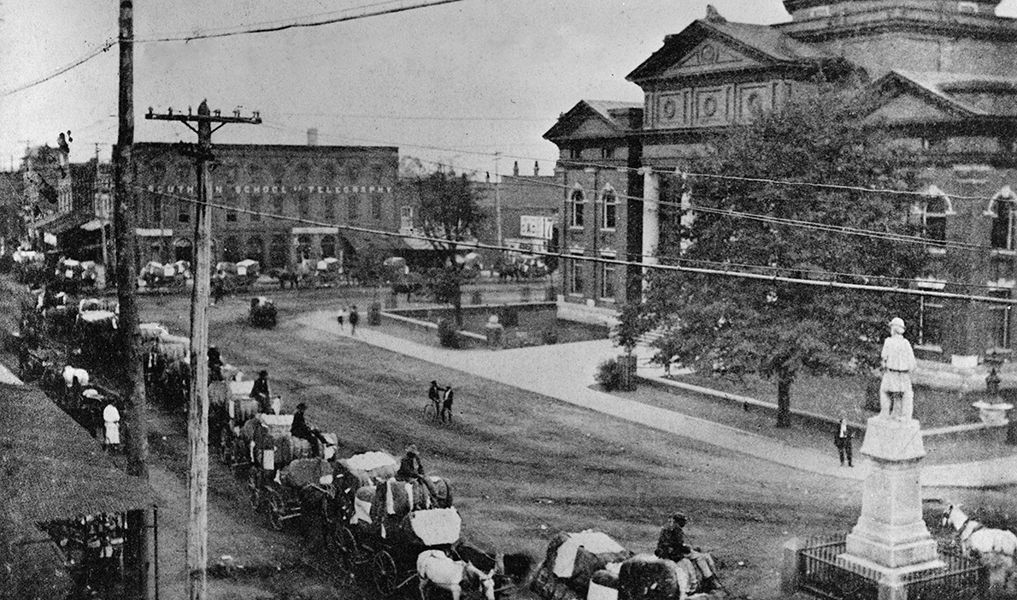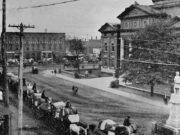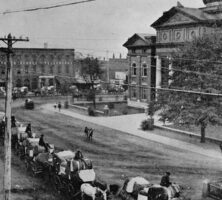Newnan, the county seat of Coweta County, lies thirty-eight miles southwest of downtown Atlanta via Interstate 85. According to the 2020 U.S. census, the population of Newnan was 42,549, an increase from the 2010 population of 33,039.
Industries include warehouse distribution centers for large retailers, and steel, plastics, and motor production facilities. The University of West Georgia has an off-campus facility in Newnan.
Newnan sits on land that originally belonged to the Lower Creek Indian Nation. Chief William McIntosh ceded the land to the federal government in the Treaty of Indian Springs in 1825. After the treaty was signed, Coweta County was established, and the settlement of Bullsboro, two miles east of present-day Newnan, was named the county seat. In 1828 a new county seat was established and called Newnan, after Daniel Newnan (1780-1851), a noted soldier and Georgia statesman.
By 1829 Newnan had a new courthouse as well as churches and schools to provide for the families settling in the area. With the coming of the Atlanta and West Point Railroad in the early 1850s, other businesses were established: Newnan’s first cotton warehouse was built, R. D. Cole Manufacturing opened a sawmill, and College Temple, a secondary school for women, was founded.
In 1860, 946 people lived in Newnan. Proud of their community, some of the residents had built spacious new houses on the streets surrounding the courthouse. During the Civil War (1861-65) Newnan escaped destruction. Because of its strategic position on the railroad, the town was selected as the site for a Confederate military hospital. The first surgical teams arrived in 1863 and took over most of the larger buildings in the town. As the number of war casualties grew, all the buildings, including schools, churches, and some of the larger houses, were used as medical facilities. In time 10,000 soldiers were housed in seven separate field hospitals scattered around Newnan, which was temporarily referred to as the “hospital city.”
In July 1864 the Battle of Brown’s Mill was fought three miles south of town. The Union troops of General Edward McCook attempted to seize the rail lines, but they were stopped by Confederate troops under the command of Major General Joe Wheeler. After the battle, wounded soldiers from both the North and the South were treated in the hospitals of Newnan.
After the Civil War the cotton textile industry expanded in the South. The Newnan Cotton Mill was organized in 1888, followed some years later by the East Newnan Cotton Mill. The R. D. Cole Manufacturing Company expanded its interests by building steam boilers and tanks for industrial facilities.
In the 1890s Newnan had a population of 2,859, and most of the businesses had electric lights. Schools were built, including the city’s first school for Black children and the Male Academy, the first local private school for boys.

The city continued its prosperity into the twentieth century. Newnan introduced telephone service, sewage systems, and paved streets. The cornerstone for the new courthouse building was laid in 1904. Free mail delivery began in 1906.
Newnan faced challenges in the decades following World War I (1917-18). Inflation and the boll weevil forced some Coweta County farmers off their land. The town still thrived in the 1920s, however, with more than twenty trains running through the area every day. The Great Depression brought a brief decline in the population. Some cotton mill employees in Newnan joined others across the South in the General Textile Strike of 1934, the largest labor strike in American history. After World War II (1941-45) Newnan prospered once again.
The Newnan of the twenty-first century is a thriving community proud of its heritage. In 2001 it won recognition from the Georgia Municipal Association and Georgia Trend magazine as a “City of Excellence.” It has six historic districts on the National Register of Historic Places and more than forty recognized historic structures. Some of the recent restoration work in town has included the antebellum houses that gave Newnan the name it carries proudly to this day, the “City of Homes.”





